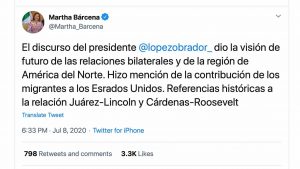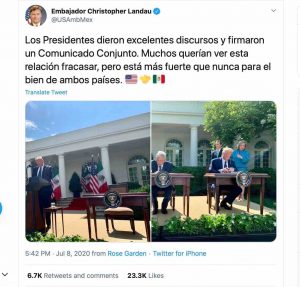 By Cecilia Farfán Méndez and Amalia Pulido *
By Cecilia Farfán Méndez and Amalia Pulido *
Unless you, dear reader of Mexico Today, have been hiding under a rock, you are aware that on July 8, President Andrés Manuel López Obrador visited his counterpart in Washington D.C. Volumes have been written about President López Obrador’s first state visit: what was said, what was left unsaid, what they wore, who wore it best, the gifts exchanged, if Prime Minister Trudeau missed out, and what it means in light of November’s election among many other topics.
Less discussed, however, is that this visit also marked a first between the two countries: citizens interested in the bilateral relationship got a play-by-play on account of essentially the live tweeting that Ambassadors Martha Bárcena and Christopher Landau did throughout the day.
Because both ambassadors tweeted in Spanish about the exact same event we can learn more about responses in social media about the state visit including variations in aggressive replies that we partially attribute to gender differences between the ambassadors.
Given the friction and asymmetry that has characterized the U.S.-Mexico relationship over the years, one would expect the U.S. ambassador to get more flak than his Mexican counterpart, specially when tweeting in Spanish. Paradoxically, this is not the case.
As of July 9, at 12:00 pm Pacific Time, Ambassador Martha Bárcena (@Martha_Barcena) had 36,900 followers while her counterpart Ambassador Landau (@USAmbMex) had 229,700. Both have verified accounts on Twitter. On July 8, Ambassador Bárcena tweeted on 8 separate times about the visit. Of those tweets, the most liked and shared was about President Lopez Obrador’s discourse including the role of migrants in the U.S. and historic relationships between Presidents Juárez and Lincoln and Presidents Cárdenas and Roosevelt.

Comparatively, Ambassador Landau had 6 tweets about the visit all accompanied by photographs, including the menu for the dinner that took place in the East Room of White House. That tweet was the most liked but the most shared was on how naysayers wanted to see the relationship between the U.S. and Mexico fail but it is now stronger than ever.
Overall, the ambassadors used a positive tone, highlighting the strong ties that bind both countries.
Beyond this descriptive information, the data offer other more relevant insights about gender violence on social media. To gauge responses on Twitter for both ambassadors, we performed text analysis focused on tweets and words and classified them into 2 categories “positive” and “negative”. Positive words include terms such as: friendship (amistad), help (ayuda), thank you (gracias), optimism (optimism) whereas negative words include: fear (miedo), stupid (estupido), and disappointing (decepcionante).
 On average, for Ambassador Bárcena, 4 out of 100 words were negative while for Ambassador Landau only 1 out of 100 words was negative and it was often directed at President López Obrador rather than the diplomat.
On average, for Ambassador Bárcena, 4 out of 100 words were negative while for Ambassador Landau only 1 out of 100 words was negative and it was often directed at President López Obrador rather than the diplomat.
For Ambassador Landau we analyzed a total of 10,491 tweets and 147,482 words. We found a total of 769 negative words while 1,124 were positive. For Ambassador Landau the most repeated positive word was “gracias” (thank you) while the most frequent negative word was “mal” (bad). Three percent of the tweets used a violent and aggressive language but as we mentioned most of these negative and aggressive responses were not directed at the ambassador.
For Ambassador Bárcena we analyzed 7,329 tweets and 102,433 words in total and also classified them into the positive and negative categories. We found 4,093 negative words while 5,182 were positive. The most repeated positive word was “gracias” while the most frequent negative word was “vergüenza” (shame).
For both ambassadors we also performed text analysis using a gender violence list which includes words and combination of words that are aggressive, violent, and rude such as ignorant (ignorante), and slang words for a woman akin to borad, chick or bitch (vieja), as well as others R rated terms. Replies to Ambassador Bárcena, showed that 3% of the tweets were violent, aggressive and with a gender stereotype. Therefore, while Twitter users replied to Ambassador Landau to lash out against President López Obrador, the aggression in Ambassador Bárcena’s account was, unfortunately, directed towards her.
While three percent may seem like a small number, the violence on Twitter against Ambassador Bárcena is yet another example of growing evidence of mistreatment of women on online platforms. Research on gender stereotypes using student evaluations of college professors on a popular internet site in Mexico found that “students refer more to the appearance and personality of female professors, and describe them more often as “bad” or “strict.” They also refer to women in less respectful terms, calling them “maestra” (“teacher”), but calling men “profesor” or “licenciado” (the title corresponding to their academic degree).” You can read the full study by Eva Arceo-Gomez and Raymundo Campos-Vasquez here.
To be sure, since his confirmation Ambassador Landau has used Twitter to communicate his work in Mexico. Generally tweeting in Spanish and sharing with his followers his admiration for Mexican culture and history and underscoring shared responsibility to common challenges. But even when we take into account his well-intentioned efforts, the disparity on how both diplomats were treated when sharing information on the state visit also sheds light on the continuing challenges that women in leadership positions face. As the expert (or otherwise) takes continue on President López Obrador’s visit to Washington, data from Twitter should also put into perspective the additional battles Ambassador Bárcena has to navigate at one of the most trying times of the U.S.-Mexico relationship.
* Cecilia Farfán Méndez is head of Security Research Programs at the Center for U.S.-Mexican Studies at the University of California San Diego (UCSD). Twitter: @farfan_cc & Amalia Pulido is Assistant Professor, Political Studies Division, CIDE Twitter: @pulido_amalia


